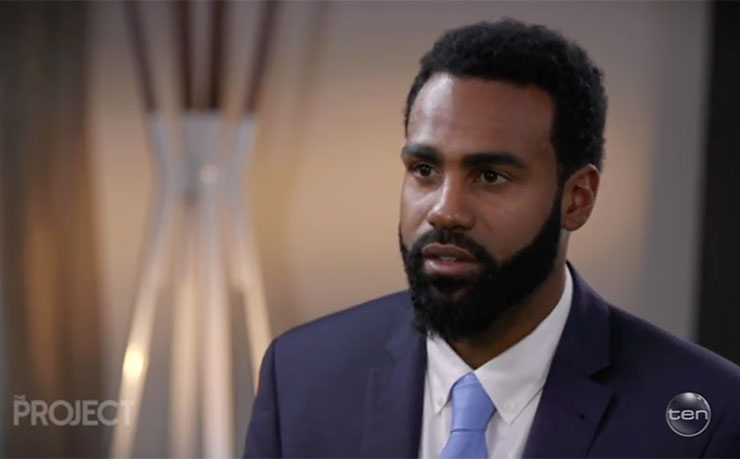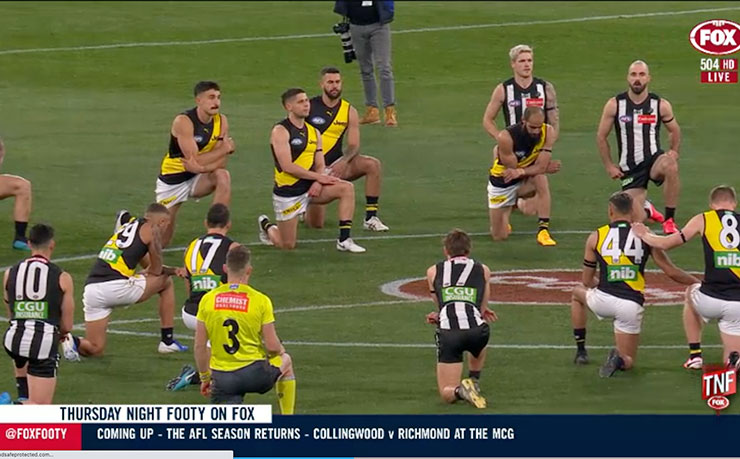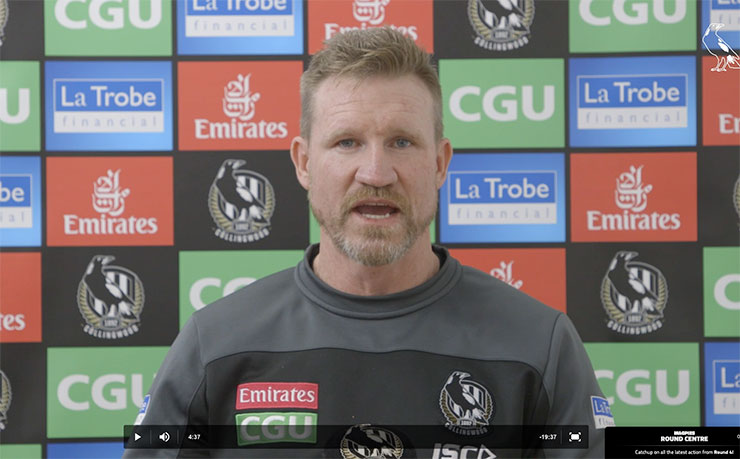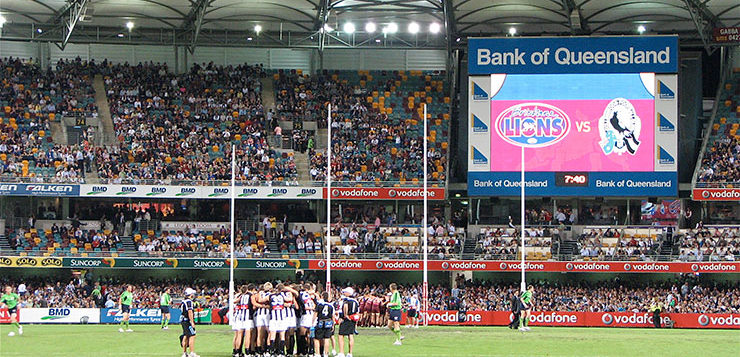You don’t have to look too closely at the growing scandal engulfing the Collingwood Football Club over its treatment of star player Héritier Lumumba to know that something is very wrong… but it helps. Chris Graham investigates.
It’s one of the oldest tricks in the political handbook. If you’re being engulfed by a growing media storm, announce an internal enquiry, then issue a public statement which laments that, alas, because an inquiry has been called (by you), it would be inappropriate to comment any further.
The tactic is designed to buy you time to ‘get ahead of the story’, and to divert media attention to a ‘new angle’. Then, if you time things right, you can release the inquiries’ ‘findings’ (which you wrote, or paid someone else to write) when the heat has died down.
As dumb as it seems, it’s a surprisingly effective strategy, hence why politicians use it all the time, and why the Collingwood Football Club tried it on earlier this week as the long-running Héritier Lumumba racism scandal continues to gather pace.
By way of brief recap, Lumumba – born in Brazil and raised in Perth – played 199 games for Collingwood, winning one premiership and achieving All-Australian honours in a distinguished career spanning more than a decade.
By 2013, his career was in trouble amid ongoing clashes with senior management and some players over racism, in particular after publicly calling out club president Eddie McGuire for likening Aboriginal star Adam Goodes to King Kong.
At the time, Lumumba had been dubbed the ‘AFL’s King of Twitter’ by The Age newspaper, and he used that account to devastating affect: “I’m extremely disappointed with Eddie’s comments and do not care what position he holds, I disagree with what came out his mouth this morning on radio.”

It ignited a storm, and Eddie got thrashed, at one point breaking down on air. Even so, Lumumba was generous in his reply, but held the line. He told Foxtel: “This man, Eddie McGuire, has done so much for my personal life, and so much for so many people that I’ve seen. I’ve seen the influence he has had, but I won’t retract from what I said. I know his intention was not to discriminate against anyone in any way, shape or form. But what was said was said, and he had the awareness to be able to immediately recognise the error he had made.”
In reality, Lumumba’s support of Goodes would ultimately cost him dearly. His relationship with the club deteriorated quickly, he asked to be traded, and he alleges that on his departure in 2014, team captain Nathan Buckley explained that things had soured because he’d thrown the club president “under a bus”.
Lumumba signed with the Melbourne Demons the following year, and then retired in 2016 over concerns relating to past concussions. He moved to the United States and got on with his life. For a few months.
Lumumba re-emerged in Australian media spectacularly in late-2017, after speaking out publicly about the culture at Collingwood, which he described as a “boys’ club for racist and sexist jokes”. The comments were for a film, Fair Game, which documented Lumumba’s public battles with his former employer.
The timing, from the AFL’s perspective, couldn’t be worse – the story dominated media coverage in the lead-up to the AFL grand finals.
Lumumba also revealed that for much of his career, he was nicknamed ‘Chimp’ by other players, which he tried to address with Collingwood’s leadership group. It was a claim Collingwood flatly denied, and after backgrounding journalists and issuing public statements which alluded to Lumumba’s ‘fragile mental health’, the story petered out.
New beginnings
Fast forward to 2020, where the #BlackLivesMatter movement in the US is forcing people around the world to rethink and revisit their past treatment of people of colour.
Lumumba’s Twitter account – from which he had previously wrought so much carnage – hadn’t been active since the 2017 scandal. But in early June, Lumumba started tweeting again, and it didn’t take long – two days in fact – before Collingwood was squarely back in his sights.
The Collingwood football club operated from the premise that I was wrong to speak out about McGuire’s racism. “You threw the president under the bus”, Nathan Buckley @cdesilva23 @davidzita1 @maxlaughton @wenzel87 pic.twitter.com/OSzB4UICAD
— Héritier Lumumba (@iamlumumba) June 9, 2020
The storm sparked by that tweet – and others – has been raging ever since. Lumumba was once again sucking out much of the oxygen the AFL was banking on for the start of the COVID-19 delayed season which, by the way, opened with AFL players ‘taking a knee’ in support of the #BlackLivesMatter movement.
That drove the AFL’s long-time ‘go to racist’ Sam Newman to completely melt down, and last week Channel 9 announced they were ending their association with him.
And the two clubs who ‘took the knee’? Richmond and, you guessed it, Collingwood.

It didn’t hose down the Lumumba story, and so ith momentum still building last week, on Monday evening the Magpies finally issued a public statement, declaring that its ‘Integrity Committee’ was now on the case.
“Renewed allegations of racism levelled at the Collingwood Football Club by Héritier Lumumba have been referred to the club integrity committee (IC) in an effort to search for the truth in the matters raised,” the statement read.
“The IC, established in 2019 and consisting of members of the board and executive, is in the process of seeking external and independent expertise to assist the committee.”
‘Renewed allegations’ is pure spin – the correct term is ‘unaddressed allegations’ – but in any event, the Collingwood Board and Executive has decided to investigate the Collingwood Board and Executive. So, you know, problem solved, right?
Obviously, any committee that investigates itself has no integrity whatsoever, and so referring the matter to a body literally called an Integrity Committee, while bold, is also plainly ridiculous. It’s straight out of the media spin playbook, which recommends that it’s always better to ‘deal with the difficult bits in the title’. But it’s actually the last line in the media statement that lays bare Collingwood’s real strategy:
“In order for the work of the [Integrity Committee] to be conducted with rigour and respect for all who may be involved, Collingwood will not be making further comment until its findings are completed.”
This self-imposed silence endured for all of about 40 hours.
SBS nails them
On Wednesday morning, SBS broke a major development in the story – two more former players, Chris Dawes and Brent Macaffer, came forward to confirm that Lumumba’s nickname at the club was, indeed, ‘Chimp’, with Macaffer telling SBS he found it “very difficult” to believe club officials hadn’t heard the nickname, given how widely it was used.
Their testimonies take the total number of players who have publicly backed the story – or significant elements of it – to seven, including Andrew Krakouer, Leon Davis, Chris Egan, Shae McNamara and Lumumba himself.
Obviously, it was a big story, and an even bigger problem for Collingwood, because it was now abundantly clear to anyone with two seconds experience in the media that the ‘Integrity Committee’ statement wasn’t ‘rigour or respect’ at all… it was simply an attempt to ‘get out ahead of the SBS story’ before it broke.
To some extent it worked – Collingwood’s statement was widely reported by media on Tuesday, who were unaware of the impending SBS scoop. But there was still the problem of coach Nathan Buckley having to front the media before the next match, as he does every week, and he was obviously also going to be asked about the new developments.
So Buckley fronted up to the press conference and did what all well media-trained spokespeople do: he ignored the questions he didn’t like, and answered the ones he did.

One journalist told Buckley he had two questions. The first was did Buckley tell Lumumba he’d thrown Eddie McGuire under the bus? Buckley replied, “What’s the second question?”
It was about whether or not Buckley ever heard the nickname ‘Chimp’. Buckley flatly denied it.
For entertainment’s sake, there was also this from Buckley: “Clearly my character is being questioned in terms of race, and I know where I stand in that regard….” Which is only half right. The part of Buckley’s character that is now most under question is his relationship with ‘the truth’, in particular whether or not he told Lumumba he threw McGuire ‘under the bus’.
And there was this, when Buckley was asked why, if he was so keen to make peace with Lumumba, didn’t he just get on a plane and fly to the US to talk to him: “Thanks for your questions Robbo. I’ve really got to leave it there because, you know, we’re following this process of, I consider myself to be pretty open and transparent – I’m prepared to share a lot of my thoughts – but the reality is that the club themselves in a statement have said we weren’t going to make any more comment, and I’ve just made a few, but I think that for the integrity of the Integrity Committee we need to let it go.”
Quite apart from the fact that Nathan Buckley just blatantly dodged a question about ‘the bus’ while describing himself as ‘pretty open and transparent’, as he delivers that final line you can hear the journalist in the background saying, “Fair call, fair call”.
It’s not a fair call at all. The ‘cone of silence’ behind which Buckley was retreating was put there deliberately by his club two days earlier, in the full knowledge that when the SBS story finally broke they would have to come out and address the fresh allegations. Whereupon, they could lift the cone briefly, deny some stuff, then pull it back down quickly when the questions got too awkward.
It’s another well-worn strategy employed in media spin, but it also makes it plainly clear that the introduction of the ‘Integrity Committee’ process is simply about providing cover for Collingwood for as long as possible. Until this all blows over.
It’s also worth noting, that’s how easy it is to manipulate Australian journalists, particularly ones who cover sport and rely entirely on access to clubs for their livelihood. I’ll come back to that point shortly.
Good intent?
The mendacity of the Integrity Committee process is obvious, but the, shall we call them ‘cultural problems’ within Collingwood as an organisation are even more transparent when you consider club president Eddie McGuire’s performance two weeks earlier, when this scandal first began to flare up again. Here’s McGuire appearing on ‘Footy on Nine’ on June 10, and pay particular attention at the one-minute mark:
"We want to find a solution."
Eddie McGuire responds to the comments made by Heritier Lumumba earlier this week.#9FootyClassified | Watch @channel9 pic.twitter.com/F5UbaL8soJ
— Footy on Nine (@FootyonNine) June 10, 2020
See what McGuire just did there? Asked about the Chimp nickname, McGuire replies: “I never heard it, but I understand that that was something that Héritier was involved in himself. I’m not going to get into the comments on it other than this, Héritier Lumumba was a valued member of the Collingwood Football Club and remains to this day.”
For people not fluent in ‘Spinese’, here’s the translation: ‘We all really like Héritier, so let’s not beat up on him here, ooh, by the way, Lumumba’s possibly a liar and may might have actually given himself the nickname Chimp?’
Apart from its obvious deviousness, what’s so striking about McGuire’s comment is that it just doesn’t even make sense. He’s saying that ‘Chimp’ wasn’t a nickname used widely by players for Lumumba, except for when it was, but that’s because Lumumba encouraged it.
Nonsensical logic aside, what you just saw McGuire do is another crude but well-worn technique in media spin. Here’s how it works.
While explaining that you don’t want to ‘get into the specifics’ of a particular issue (because you’re pretending to try and do the best thing by the person the issue is about), you work in a quick smear that can’t be proved or disproved, but which you hope will get the attention of journalists and open up a new story angle which will distract from the issue you’re trying to avoid talking about. In other words, it’s misdirection by smear.
The technique is defamatory and utterly dishonest, but if you’re going to sink that low, it’s always best to deliver it with a straight face (note to Collingwood spin doctors: you need to explain to Nathan Buckley that smirking through it – particularly when you’re ‘alluding to mental health issues’ – undermines the whole exercise).
That’s from Buckley’s 2017 press conference, where the theory was advanced that Lumumba was struggling with some mental health issues. If universities ever run courses on the in-exact science of body language, I imagine that performance by Buckley – the self-described ‘man of openness and transparency’ – might make the curriculum.
A long lesson
It’s pretty clear that McGuire, Buckley and Collingwood more broadly have learned little from the Lumumba scandal, which now lumbers into its third year. In McGuire’s interview above, he notes that it’s irrelevant whether or not he thinks Lumumba ‘threw him under a bus’ over his King Kong comments.
“It doesn’t matter. People felt what they felt at that stage. There’s no buses here,” McGuire says. Except that there is a ‘bus here’, and it’s a big one, and it’s trundling down the Batman Avenue with Eddie, Nathan and Collingwood’s name on it.
The question is whether or not it ultimately collects them, because media spin can only paper over so many cracks, and it can rarely fill in enormous holes. Having said that, a ‘he said, he said’ scandal like this – particularly one dripping with highly paid spin doctors – requires Australian media to do their job, like SBS did. It requires them to properly prosecute this issue, not remark ‘Fair call, fair call’, when they’ve just been played.
So where this all ends is anyone’s guess. For his part, Lumumba is not backing down – he responded with more tweets late yesterday to Buckley’s press conference. And he’s published a lengthy response on The Guardian a short time ago.
1. Interesting that Collingwood is now shifting its narrative to claim that they are trying to 'reach out' to me. Let me very clear: I have no intention of sitting down with anyone until they publicly acknowledge some fundamental facts.https://t.co/RLPfGD6w6N
— Héritier Lumumba (@iamlumumba) June 12, 2020
Whatever happens, it’s worth remembering that it took the AFL just shy of four years to eventually come out and ‘unreservedly apologise’ for the treatment meted out to Adam Goodes, an Aboriginal AFL star who was hounded to early retirement in 2015 after repeatedly calling out the game’s racism.
But it’s also worth remembering that the AFL issued that apology on June 6, 2019, less than 24-hours before the airing of a documentary, The Final Quarter, which exposed the true extent of the public assault on Goodes, and the whimpering silence of the AFL.
Additionally, interested punters might like to know that today, Collingwood confirmed to New Matilda that its media statement on the Integrity Committee was issued a few hours after it ignored a deadlinefrom SBS to provide comment for the story. Although, Collingwood maintains the timing of the two issues was completely unrelated. Obviously.
Speaking of things unrelated, it’s also worth noting that the decision to allow Collingwood and Richmond players to ‘take a knee’ on June 11 was made about 24 to 36 hours before the game. Which is at least 24 hours after Héritier Lumumba started once again tweeting about Collingwood’s ‘cultural problems’.
It’s entirely possible the timing of those two issues is also ‘purely coincidental’. Collingwood has refused to comment, so I guess we’ll just have to wait for the ‘Integrity Committee’ to get to the bottom of it all.
Donate To New Matilda
New Matilda is a small, independent media outlet. We survive through reader contributions, and never losing a lawsuit. If you got something from this article, giving something back helps us to continue speaking truth to power. Every little bit counts.




